Business
Learn how to maximize company health benefits while minimizing cost [Podcast]
Published
4 years agoon
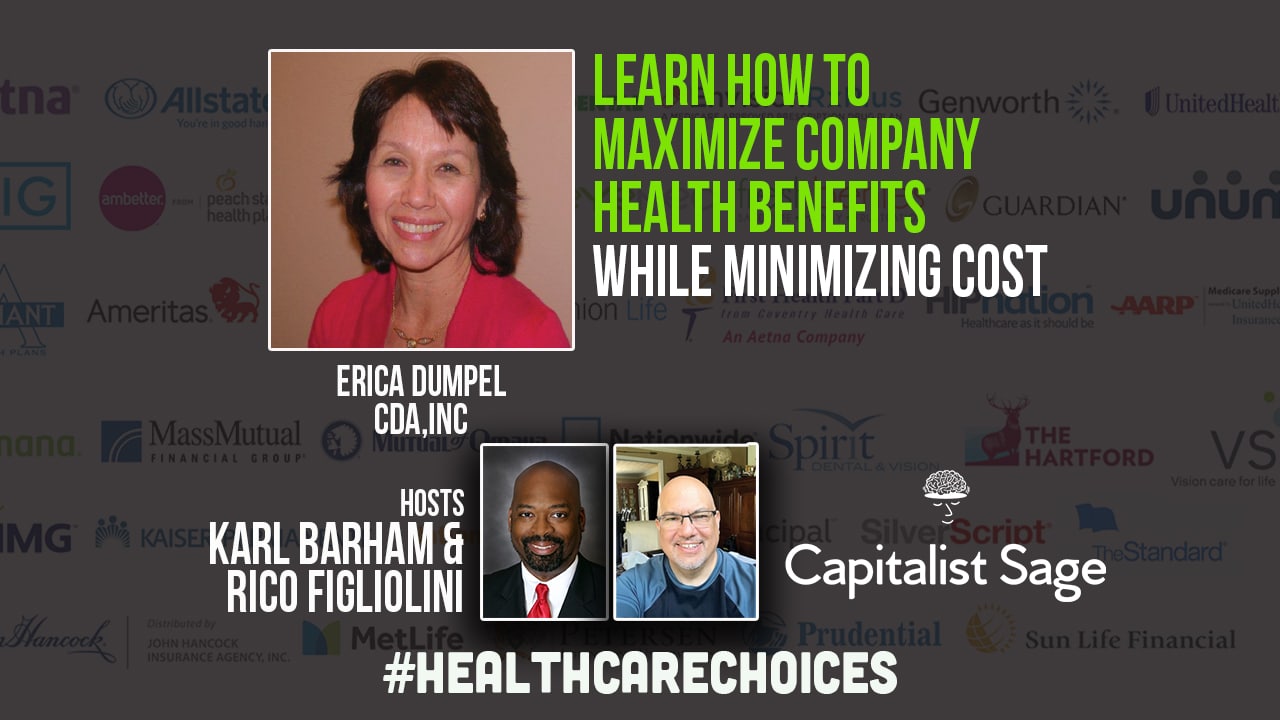
Health Insurance, for small business owners as well as individuals, can be difficult to navigate. There are tons of options in the market and outside of it, so where do you start? Our guest on this episode of the Capitalist Sage, is Erica Dumpel, founder of CDA, Inc., an insurance solution provider that helps both individuals and small businesses. She’s got over 40 years of experience in the healthcare insurance industry and she’s here to share some tips and information on how to make better decisions and start asking the right questions of your insurance providers.
With you hosts Karl Barham and Rico Figliolini
Resources:
CDA Inc. Website: http://cdainc.net
Erica’s Email: Erica@CDAINC.net
Business Phone: (770) 449-7369
Timestamp:
[00:00:30] – Intro
[00:02:11] – About Erica and Her Business
[00:02:58] – Group Coverage and How It Changes
[00:09:48] – Differences in Coverage Across the Country
[00:11:29] – The Affordable Care Act
[00:14:18] – How Employers are Handling Insurance
[00:17:18] – HMO vs. PPO
[00:19:15] – Physicians Outside of Networks
“If you sit down with a coffee cup on a Saturday morning and a yellow pad, and you go back and say, okay, last year, what did we use? What did we do? Pull up whatever checkbooks, credit cards, EOBs, whatever you have. Go back a year earlier, if it was different. Look forward. And I’ve told everybody, please ask your doctor what is on the horizon… We are saving people all kinds of money with a little bit of homework.”
Erica Dumpel
Podcast Transcript
[00:00:30] Karl: Welcome to the Capitalist Sage Podcast. We’re here to bring you advice and tips from seasoned pros and experts to help you improve your business. I’m Karl Barham with Transworld Business Advisors, and my co-host is Rico Figliolini with Mighty Rockets, Digital Marketing, and the publisher of the Peachtree Corners Magazine. Hey Rico, how are you doing today?
[00:00:47] Rico: Good Karl. I hope you’re well.
[00:00:49] Karl: I’m doing very well. We’ve got a rainy day out there today. It’s fall, it’s finally here. And why don’t you introduce our sponsor for today?
[00:00:59] Rico: Sure. Peachtree Corners Magazine, which we just put out our latest issue, is the sponsor of this podcast. Along with Peachtree Corners Life and Prime Lunchtime with the City Manager. So you can check us out on LivinginPeachtreeCorners.com or check out the Capitalist Sage website at TheCapitalistSage.com as well.
[00:01:18] Karl: Excellent. Well, today we are going to talk about health insurance and various options, especially for small business owners and individuals that are trying to navigate all these options in the market or with other plans. Today’s guest is Erica Dumpel. She is the founder of CDA, Inc., an insurance solution provider that helps both individuals and small businesses. She’s got over 40 years of experience in the healthcare insurance industry. And she’s here today to share some tips and information so that people that have to make decisions over the next you know, 90 odd days are informed with various options and at least start to asking the right questions of your insurance providers and the folks that help you with that. Hi Erica, how are you doing today?
[00:02:08] Erica: I am doing great. Thank you so much for inviting me.
[00:02:11] Karl: Oh, it’s my pleasure, my pleasure. Why don’t we jump right in and you share a little bit about yourself and what you do, and tell us a little bit about your business?
[00:02:19] Erica: We are a small business in Norcross, Georgia. We are a party of six, with a couple of dogs as extras, our security crew. Since 1975, we have had an agency that focuses on small companies, individuals, and seniors. So we work primarily with companies of less than 50 employees. Where sometimes individual products are appropriate, sometimes the group products are appropriate. And then we layer in there, all of the issues related to Medicare, because we have an increasing senior population that is continuing to work. So that has become an extra layer of conversation.
[00:02:58] Karl: Oh wow. I know that everyone this past 18 plus months, everyone’s health has become a critical point of discussion in family. And there are people that may not have had health insurance before, or had less health insurance, that are probably looking at the future differently than they have in the past. And so why don’t we start off with just talking about when you see individuals and small businesses, just high level, what are some of the options they have if they want to get better health insurance and healthcare?
[00:03:30] Erica: Let’s start with the groups, okay? So whether you are two people or 49 people, you are in a specific category called small group. You can do the guaranteed issue, affordable care act plans, which means they are cookie cutter. They are predetermined. The rates are the same, whether you are healthy or sick, whatever industry you are in. It’s a great starting point. Especially if someone has some medical issues in their group. If on the other hand, that same group of people can answer medical questions positively. There is an improvement in rates by going into medically underwritten coverage. The next level beyond that is, if you can do that and you can qualify for one of the programs that gives you an opportunity to get back any claims dollars that you haven’t used, that becomes even more attractive. And then there’s some other layers beyond that. But what we are finding now, and we have found it, the pendulum swings back and forth. What happens is, a couple of years ago, group rates were significantly less expensive than individual rates. Well, the pendulum has swung. And in the state of Georgia, individual rates are swinging more and more cost-effectively away from group. So all of a sudden we are talking to our employers, whether they are 49 or whether they are two and saying, does it make sense to unbundle the group product and look at an individual coverage, HRA? An ICHRA, you may have heard of that, or a QSEHRA is another one that’s out there. Does that make sense? Number one. Number two, does that get you away from some of the compliance issues? You put in a medical group plan and you have responsibilities that someone may not tell you about, or you may not be aware of how important this is. The penalties can be $110 a day times the number of employees, times the number of days since the infraction. These are real numbers. So we look at it from that side, then with some of our clients where some of the incomes are lower, and we’re talking the nonprofits and some of the nursery schools. What if we look at completely unbundling it? What happens if we help these people look at marketplace policies? Where suddenly now we have subsidies, which means we are able to reduce premiums based on income. If the incomes are low enough, you get that plus you get an improvement to a lower deductible, a lower out of pocket. And the employer rather than funding, or having to fund a portion of it, simply steps away. And says, Erica and her crew or whoever the broker is, is going to come in is going to do the guidance. Is going to do the education, is going to help with the enrollment. We are getting out of the group business right now because it is more cost-effective, it is better coverage for our employees. So that in a nutshell is what’s going on right now. And it is a busy time.
[00:06:22] Karl: Let me ask you some questions to see if I understand this correctly. If I’m an employer that have, maybe relatively low earning employees in my plan, and I want to offer some form of health coverage for them. Can you describe the name of that? The last one that you mentioned. And am I understanding it right where they can opt in? I can offer the plan, but I’m not required to contribute into it?
[00:06:50] Erica: You are not offering the plan, you are stepping away. You’re saying I have historically paid X dollars. I paid 200, $300 a month for everybody’s coverage. We either cannot afford to do that anymore. With COVID that has been a very common comment. Or we find that it’s not as cost effective. We have in particular a daycare center, the employee premium is going from four 40 to $480 a month for a $6,700 deductible. Okay? These folks are making very low income. If we take the employer out of the picture and say, we are dismantling the group. Okay, you are not going to pay anything. You are simply going to do steerage. We take the employees to the marketplace and determine as an example, Rico, you’ve got this age, this zip code, these doctors, these drugs, these family members. These plans make the most sense for you. Karl, you’re in a different zip code. You’ve got different needs. Everybody picks what they want. And it may be, Rico, you need a high deductible health plan. You don’t use this stuff much. Karl, you may have young kids running around. You may need co-pays. I don’t know. But you can finally fit the right product to the person instead of, and I’ve said for years, if I do my job right on a group product, everybody’s unhappy because I have to find the average. So here we finally have the opportunity to get the right fit for the employee.
[00:08:14] Karl: What changed to make that happen?
[00:08:16] Erica: It was the marketplace subsidies many years ago. Then those became less attractive. And now with the COVID, especially in the Atlanta market, we have more people looking for individual health coverage. We have carriers who’ve been here now, six carriers who have been here for a couple of years with good numbers. Good results. Four more carriers are coming into town and these are not small carriers. Aetna is coming in under the CVS banner. United Healthcare is coming in. Friday Health Plans is coming in from Colorado, they’re a good player. And Bright Health Plans is coming in, they’re already in North Carolina. So there’s an expansion of opportunity. But the biggest thing, so we focus on premiums, obviously the cost. We focus on the benefits, because if I can get you a lower deductible for the same or less money than you were paying before, you win. But the biggest change this year has been, these plans started as skinny HMO’s. So the reimbursement rate through the providers was very low. So doctors said, we’re not playing this game. We can’t afford to do that. So each of the plans had one or two hospital networks. So all of a sudden, I don’t know if you’ve noticed, but a lot of doctor practices are selling out to hospital groups. The Laureate Group is now owned by someone else. So everybody’s being bought and the Piedmont Clinic is expanding and magically those are all now participating providers under the hospital system. So our network has blossomed. That’s been our concern, is if I can’t find you the right doctor, then everything else is meaningless.
[00:09:48] Rico: Doesn’t it get a little, I remember when the ACA came through. There were, I think only three, insurance companies in the state of Georgia at one point. Because they didn’t want to participate. They actually left. I forget if it was United Health Care, one of them decided, that’s it I’m not doing it anymore. So now you’re saying that, I mean, most people that are, have gone through the system, north of 50 years old, figured that group insurance would be cheaper. Because you’re taking advantage and leveraging people. But what you’re saying is that’s not the case anymore. That I can go out, buy my own individual insurance. Yes, customize it to me, but it would still be competitive in the marketplace. Even if I don’t have a group behind it.
[00:10:33] Erica: It depends where you are in the country. And I found this wonderful map that goes from dark blue to dark brown. And the dark blue is where the group products are more competitive. And the dark brown is where the individual is. So if you’re in Texas, it’s this shade of blue behind me, okay. Don’t go looking for individual contracts there. The Savannah area, Macon and south, is a dark tan. The Atlanta market is a gray going into a nice shade of tan telling us that right now, this is the place to be. You’ve got to be fleet of foot. You guys are paying health insurance premiums, this stuff is heinously expensive. You know, we spend more time pricing our groceries than we do our health insurance. And how much does this stuff cost us to use? That’s the other part. It’s great, I have a $6,700 deduction. That’s like having no insurance for most of America. That’s a problem.
[00:11:22] Rico: Yeah. And especially if you don’t have copay or you’re paying per doctor visit and stuff like that. Yeah. I could see that.
[00:11:29] Karl: So I’m going to take this moment to re-introduce Erica Dumpel with CDA Inc. Health Insurance. Helping people find health insurance solutions. I want to kind of start back and maybe you could help me with the history. When Obamacare, which the marketplace, these terms we’re using them interchangeably. When that became available early on, I know there were fewer options of insurance. People were unsure about it. And they also, to be able to participate, there were certain requirements that had to be met to qualify for a marketplace plan. Are you saying now that the marketplace, there’s more plans available in the marketplace and you can customize them to yourself, but they still meet those initial requirements?
[00:12:17] Erica: I’ve done this for 46 years. So we were back to the hospital surgical days, before there even were PPOs and networks. What happened when the Affordable Care Act came in was, a bunch of companies got very excited and said, oh, this is a great opportunity. And so they came into the market. The Humanas, the Aetnas, the United Healthcare. They all jumped in. The Affordable Care Act, qualified plans had to meet certain requirements. They had to have the federally mandated wellness and preventive guidelines. So there are all kinds of little things that were required. What happened was, you could qualify for a marketplace plan or you could qualify for an ACA plan, period. I mean, you were buying a cookie cutter plan from originally 6, 7, 8 companies. You would qualify for a subsidy based on income. So they look at the family size, they look at the income and they say that your premium cannot exceed X percentage of your income. If you are between 250 and 400% of the federal poverty level. There were different buy downs on and on. Fast forward to the COVID issue. The government realized we had a whole bunch of people running around with no insurance because they couldn’t afford it. So not only did there appear or does there appear to have been an increase in the subsidy amount that people are getting, but where everything seemed to stop at 400% of the federal poverty level, now it’s going beyond that. If you are above 400%, you are not going to have as big a help. But you’re still going to have some help, if the premiums exceed a certain percentage of your income. So it’s an effort by the government, in my opinion, to get as many people covered as possible. The more people we have who are not showing up at emergency rooms or at hospitals without a negotiated network, the less the rest of us are going to be paying for their costs that are being written off and passed onto the rest of us.
[00:14:18] Karl: Got it. So in the scenario that you described where employers don’t offer group plans, is it the idea that they can offer them some kind of cash bonus credit or something as they choose their own to help them offset their costs? What do you see employers doing? Or are they just stepping away from it completely?
[00:14:37] Erica: Many employers, I suspect are just going to step away completely. Our clients are not like that. Our clients are taking those dollars and saying, okay, rainy day. Because in two years, this all may shift the other way. So let’s kind of bank that for the moment. But let’s look at things that individuals cannot purchase cost effectively. Dental, vision, disability products. You cannot buy a cost-effective disability product. But on a group basis, it’s pennies. Life insurance, cancer, accident. All of those workplace products become an uninteresting thing. In some cases, some of our employers are saying we are not allowed to pay for the health insurance, but we can bump. This guy has been with me for 15 years, I’d like to give him $300 a month. This fellow is brand new, I’d like to give him a hundred dollars a month. I’m just going to raise the salary, and make it clear to them that it is because of this. At some point, we may need to take this money back, if we go back into the group business. Please don’t forget why you’re getting this money. Because that’s very easy to forget, unfortunately. A lot of companies right now are fighting to attract and retain their employees. So anything that improves a situation, maybe saves a little money for the employer for a rainy day. Maybe allows, I don’t know, a bigger Thanksgiving dinner or whatever. I don’t know. There are all kinds of things that can be done with those dollars.
[00:16:02] Rico: There’s a friend of mine. His company provides group insurance. But he’s also told his individual employees, if you don’t want to be on this group insurance, this agent that I use, this company to use, can provide options for other insurance that you can purchase separately. Now he’s not bumping salaries per se to cover that, but he’s giving options. Because he’s saying you may be able on your own to get it cheaper than what I’m able to give to you as a group. Because like you said, everyone’s a little different, right? It could be a 25 year old working for him versus a 40 year old with two kids.
[00:16:39] Erica: The thing to be careful of is, when the employer says, go work with this broker and go get a subsidy. Okay? So we have to be very careful. One of the kick outs is if you are eligible for coverage under a group plan through your employer or any other employer, to whom you are affiliated, spouse as an example, you cannot have a subsidy. And what’s happened is that people were not told that or are gaming the system. At some point, they’re going to get caught on that. And there will be certainly a return of that money. Certainly there’ll be some kind of penalty. Right now, not. But in the future, there’s going to be some kind of penalty for that.
[00:17:18] Karl: So I’ve got another question about the, in Georgia locally here, the options in the marketplace, ACA. Most of them in 2020, I remember seeing something. Over the last several years, they’ve mostly been HMO options. I don’t know if there was many PPOs and then there might’ve been a few HSA, high deductible HSA plans. In this coming, do you have any insight of is there any change in options for folks? And just generally your thoughts on the pros and cons of HMOs versus PPOs when people are trying to select what’s right for their particular situation.
[00:17:52] Erica: Everything on the individual market is an HMO. So that simply means that unless you have a life or limb threatening emergency, you need to stay in your network. And generally it is a hospital driven network because a carrier will have a relationship or a contract with North Side and Emory, as an example. So we do not have PPOs in this market and we have not in a very long time. There were point of service plans for awhile. They do not exist on the individual side right now. I don’t see them coming back. The big risk with the point of service that people, I don’t think really understand, is if I go to a non-participating provider. Yes, I have a separate deductible and yes, I have a higher co-insurance amount. I see that. What I don’t see is, what the accepted rate, the usual and customary, the negotiated, whatever you want to call it is. So if I go to a non-participating provider and that doctor runs up a thousand dollar bill, and my plan is going to pay 60% and I’m going to pay 40%. It’s not necessarily of that thousand dollars. If a participating provider would have accepted $150, I will get 60% of the 150. The rest of it is all on me. So that’s the big concern with the point of service plans.
[00:19:15] Rico: Is that because when you get explanation of benefits, the doctor’s bill is $1,500, but the contracted or agreed upon by the insurance could be a thousand dollars. And by the way, we’ll pay 60% of that. And you’re responsible for the other 40 of that discounted rates.
[00:19:31] Erica: That’s if you’re in network. If you go out of network, you now get a $10,000 bill negotiated down. And the in network would have paid, would have negotiated a thousand, but you’re getting 600 on a $10,000 bill. That’s the trick. And that’s where people get caught.
[00:19:49] Rico: Yeah. My daughter was in Berry college. She got hurt. She fell off a horse, equestrian rider. Had to go to Rome’s emergency hospital room out of network. I mean, had to go. That was the only hospital in the whole place. And then we get a bill like a month later, I think it was. And it was just horrendous. I mean, nothing happened with her. She just needed a scan to make sure everything was okay. But yeah, it was not good.
[00:20:13] Erica: But it should have been in network because it was life or limb threatening. So was it coded properly? I just joyfully walk into the Rome hospital cause I happened to be there, versus I just fell off a horse. That’s a whole different feeling, so that should have been treated in network, but that brings us to a whole different issue. There are, in the participating hospitals, physicians primarily radiologist, pathologist, and anesthesiologists, who are not participating. And those are the surprise bills. You may have had a surprise bill. That’s what all the legislation is discussing now, because what are you supposed to do? You can’t ask? I don’t know who’s the anesthesiologist, you know, when I’m getting my head cut open. I don’t know. So that’s going to be a real interesting discussion
[00:21:02] Rico: Because they’re individual like subcontract. This is the way I looked it. The hospitals, the shell, they like the hair salons. They have a chair and they need to make money. And that’s what they’re doing. And you’re right. And I think that was part of that issue was the, it was that part of it that really got us.
[00:21:17] Karl: If I could ask you then, what do people do about that? If you need to go for a procedure for something, are you supposed to ask? What’s best practice? Ask, is everybody that’s providing medical care to you during your surgery and post-surgery in this plan? Or how do ordinary people avoid getting those surprises?
[00:21:39] Erica: Most of it when you pre-certify a surgery, and if it’s an emergency obviously it’s a whole different story. But if I pre-certify a surgery, I’m going to the insurance company and saying, I’m having this done. And checking is the surgeon in, is the assistant surgeon? Because that’s where the problem is, the assistant surgeon. Is the hospital? You can’t really check the anesthesiologist. So that’s a big problem. But I have one client who delivered a baby. And it was about a month or so after a friend of hers that delivered a baby. And the husband took it upon himself to not have the same mistake that their friends had. He stood at the door, the entry to her room, and everybody who walked in, he asked, are you a participating provider? Because his, their friends had gotten hosed. Because every time a doctor sticks his or her head in, cha-ching, there’s a bill. So that’s the extreme, but they were so proud of themselves because they had no surprise bills.
[00:22:33] Karl: That’s fabulous. I could see someone making a shirt for that as they come in and have people sign in. I’m pretty sure that’s not how healthcare is supposed to be for most people. That’s the world that we live in. If I can come back to when you look at the options, you had mentioned new providers coming in? I don’t remember who was in last year, but there were, maybe there were more than the year before. Are there more options coming in this, do you have any insight into that yet?
[00:23:02] Erica: We had the core six, which was Ambetter, CareSource, Anthem Blue Cross, Kaiser. I’m blanking out. Oscar and somebody else. This year being added in, oh, Allied. This year, being added in are United Healthcare, Aetna as CVS. I don’t know who bought who, but they’re under CVS now. Bright Health Plans, and Friday Health Plans.
[00:23:24] Karl: Now, can I ask a question? How do people navigate, they change jobs or they move or change. They have a doctor that they like that’s in one plan. The kids have another doctor in another plan. Everyone has doctors. Either they’re dealing with chronic stuff or things that have been going on for awhile, and then they have to change insurance providers with different groups of these groups. How do people, how do you suggest people navigate that?
[00:23:54] Erica: It’s a difficult thing, especially when we have, call it skinny networks or call it limited doctors lists. In the old days, if you went from an employer plan with Aetna to an employer plan with Humana. Yeah, it was the same doctors. It was no big deal. What we’re finding now is if I’m in a plan that has a Piedmont base, it’s going to be a different set of doctors than a North Side base. So you have to be oh so careful. If someone is in the middle of something, very extensive cancer, heart condition, whatever. Many of the plans will allow that particular problem to finish with the existing doctor, as long as there’s notification. But then you do have to switch from one provider to another. And that’s a problem. So this year I’m with this pediatric group and the next year I’m with that pediatric group. And the lock-in to a doctor is a real problem. I got lucky. I found a doctor who takes everything and it’s just an incredibly wonderful old fashioned doctor. But when you’re in these practices that sell to or sell out to a hospital chain, they’re only going to be in one hospital. It’s a system. That is going to be a big problem.
[00:25:01] Karl: Got it. The other thing is in, when they’re looking at it, the different levels, gold and platinum and silver and blue and all the different levels that people have. Any thoughts on, differences between? Is it just about the dollars? Are they really worth that being distinct from each other?
[00:25:19] Erica: It depends on very specifically on what your needs are going to be for the next year. So a gold plan is going to have a higher reimbursement on your expenses than a silver or bronze or whatever. So those actuarial levels were all calculated. If you qualify for subsidy, start by looking in the silver plans. Because that’s where you may get your best bang for your buck. If you are below a certain level of the poverty level, you get that improvement in benefits, is what I call it. They have some other term, but your premium comes down. You’re out of pocket comes down, potentially. If you are very young and you never use this stuff, and there’s a young woman who called me and we’re working on her stuff right now as a Guinea pig, we have the opportunity to put in a catastrophic policy. And the thing is going to have an $8,500 deductible. This child is 26 years old, but she’ll have all of her preventative stuff covered and three primary care office visits. She doesn’t have anything. This is perfect. And the premium is $206 a month. She can afford that at that age. If I have a bunch of kids running around with antibiotics and tubes in their ears and constant this and that, I’m going to need to get a richer plan. But if you sit down with a coffee cup on a Saturday morning and a yellow pad, and you go back and say, okay, last year, what did we use? What did we do? Pull up whatever checkbooks, credit cards, EOBs, whatever you have. Lineup all the people in your family and figure out who did what. Go back a year earlier, if it was different. Look forward. And I’ve told everybody, please ask your doctor what is on the horizon. Sometimes people are just in denial, but if I’m carrying a lot of weight and I have blood pressure problems and I’m having trouble losing that weight, I’d better be aware that there’s something on the horizon for me. If I have diabetes and I don’t have it under control, what is the next level of insulin I’m going to? What does that cost? Nevermind, what can I do to push the time backwards? Bring it down to scale, but you need to be aware of how much you use it. The advantage is every year you can make a change. We are no longer medically underwritten. So the fact that you do get sick, next year, go ahead and change. And same thing with the Medicare folks, with their drug plans, oh my gosh. They need to every single year, look at their drug list and compare it in terms of what their plan is this year to what it could be next year. We are saving people all kinds of money with a little bit of homework.
[00:27:46] Rico: I mean, some insurance companies don’t want to cover certain medications. They might cover the generic. They might decide to cover the brand, but not the generic. I’ve seen that. I’m an individual business owner, right? Just me. I don’t have, I have 1099 employees, if you will. They’re subcontractors, freelancers and stuff. I would be looking at an individual policy then, versus a company policy or group policy, because there’s just me. So no different than anyone else that would be looking for themselves, pretty much. The way it used to be.
[00:28:16] Karl: What about outside of the marketplace? Who would you recommend look outside the marketplace? I understand if you have pre-existing conditions and so on, but when is that a good option for individuals, small business owners?
[00:28:31] Erica: The marketplace has all 10 carriers. In the Atlanta market, okay? Has a series of products with a pricing structure. If you are going to look for a subsidy, you have to enroll through that and get your subsidy there. On the other hand, if an employer is putting in an ICHRA, in individual coverage HRA, where they are more involved and they’re saying no, no, we still want to manage this. We just want everybody to have their own choice. There we have to be careful because standing alongside the 10 carrier marketplace plans, are 10 carrier non marketplace plans. So they’re going to be usually a little bit richer, a little bit less expensive because you can’t get the subsidy on it. But the trick now is if I put in an ICHRA, and I want my employees to be able to pre-tax their portion of the premium because now I’m paying a part of it, I have to make sure that the decisions and choices are made off the non marketplace policies. A lot of people don’t know that I’m just waiting to see what blows up next year on this, because they’re going to say Johnny went over to the marketplace and they signed up and it looks the same as off marketplace. Different coding, different rules. So it’s a little bit more complex than people realize, but the difference between the two is marginal. But it could be that the non marketplace plans could be a little richer and a little less expensive. They were this year for some carriers.
[00:29:56] Karl: So if you could share some of the dates that are coming up, I know enrollment periods are starting. Can you highlight some of the key dates people should pay attention to?
[00:30:04] Erica: Medicare open enrollment, which is for Medicare Part D Drug Plans and Medicare C, Medicare Advantage Plans, October 15th through December 7th. Unless you have a qualifying event, which means you’ve lost coverage or something else, that is your only window for a January one effective date. And you are locked in for 12 months, essentially. There are some parameters, but consider you are locked in for 12 months. The individual marketplace starts November one, next Monday. And for everybody who enrolls between Monday and the 15th of December, they will have a January one effective date. And that’s where it stopped last year. This year, the government is expanding it an extra 30 days going to January 15 for a February one effective date.
[00:30:51] Karl: Got it. Got it.
[00:30:51] Erica: Those are your key things. For many people who have group plans that seem to enroll, or it seemed to renew January one, which is a large proportion of the United States. Right about now is when everybody’s being handed their open enrollment packets and being told, make your decisions. So again, doing the little exercise, getting the yellow pads, sitting down and figuring out how do we use this stuff? In the past, you would want to get the richest plan you possibly could, because if you got sick, you could not make a change. Those days are gone. So now, what size shoe do I need this year? What size shoe do I need next year? And what size shoe did I have last year? So we really need to start paying attention to how we spend our money, premium wise and claims wise.
[00:31:36] Karl: Wow. Those dates are coming up quickly. But that’s some good tips as far as starting to look at your past spend and asking the questions of what your future spend may look like depending on your family situation, there’s pregnancies or dealing with knee surgeries or back surgeries and things of that nature. It’s the right time to make those decisions. I know there’s a lot more we can cover and talk about. And I’d love to have you back again and we can talk some more about different changes as things evolve. But if someone wanted to reach out to contact you, what’s the best way to reach Erica?
[00:32:11] Erica: Easiest, probably is my email. It’s Erica, Erica@CDAINC.net. And the office phone number is (770) 449-7369. There are six of us here, support staff and sales reps. Anybody can get the conversation started, whether it’s group or individual or Medicare, it doesn’t matter. We’re happy to help any way we can.
[00:32:37] Karl: Well, excellent. Well, it’s the fall season and going to fourth quarter, which I could imagine is a, busy time for you. Do you have anything coming up? What do you got keeping you busy this next few months?
[00:32:47] Erica: Exactly what I just discussed. Seeing a lot of clients and a number of folks who have been referred to us are coming with questions. Because there’s a lot to digest this year. More than in prior years, there are a lot of options. People really need to take a peek at what their options are because this stuff is incredibly expensive.
[00:33:08] Karl: I’d also like to add a shout out to the Southwest Gwinnett Chamber Friday coffees. You come there, you’ll meet folks like Erica. Several other folks that can help you through insurance issues and other issues for your business or for your individual self. Stop by on a Friday at 8:30 in the morning for Friday coffees with the Southwest. And Erica, I know you’re often there and that’s a good way to meet her and some of the other folks that work in this space. I want to thank you so much for joining us today and just helping with tips and helping people become more aware and every time Rico, we do this right, we learn something else.
[00:33:44] Rico: This was great. Thank you, Erica.
[00:33:46] Erica: You’re very welcome.
[00:33:46] Karl: We’re all just a little bit smarter about, just the options and the decisions that we have to face. Open enrollment is starting up soon. I think November 1st for most people. Do those exercises, talk with your families, talk with your employers about some of the plans that are outside the marketplace. And just try to do the best thing for your family. If anything, we learned over this last year is taking care of your health is really important. And you can’t plan for when you’re going to need health insurance and deal with it. All the people that got COVID, whether they have to get well at home or go out and go to a hospital. And there’s going to be some time before people recover from the health costs that were incurred. The costs to their livelihoods, their employers and so on. So it’s a smart time to think about what choices you’re making for next year. And Erica, thank you so much for helping us through that. Today we had Erica Dumpel with CDA Inc. Just sharing some of those insights on the healthcare options for folks that are out there. I’m Karl Barham with Transworld Business Advisors of Atlanta Peachtree. Our business advisors are available to help you consult on your business. Whether you’re looking to improve your business, to grow your business, or when you’re ready to exit your business. You can contact and schedule a consultation with us. My email is KBarham@TWorld.com. Or you can visit our website at www.TWorld.com/AtlantaPeachtree. Our goal is to help support the local business community in any way we can. Even if it is connecting them to experts in different areas that can help them with their business or when they’re ready to exit or sell their business, we can help them with that as well. Rico, why don’t you tell us about what you’ve got going on?
[00:35:31] Rico: Sure. We’re working on the next issue for Peachtree Corners Magazine. That actually comes out in December. But we just started working on editorial now. Lots of good stuff we’re planning on. And the latest issue is out now. You can go to LivinginPeachtreeCorners.com to check out the digital version of that. And doing the normal things that I always do. Mighty Rockets is my company. So if you’re looking for branding, marketing, social media, online management of your presence there. Just contact us and we’ll be more than happy to help you with managing your social media, video production, and podcasts even. So check us out at MightyRockets.com. So all good. It’s a great day. It stopped raining too I think.
[00:36:14] Karl: Yeah, it did. Well, thank you everybody for joining us on the Capitalist Sage Podcast, we’re going to continue to bring you local experts and business owners and just continue the conversation. So everyone have a great rest of the week. And for those get ready for Halloween this weekend. Be safe out there and watch out for the kids. Take care of everyone.
[00:36:33] Rico: Take care.
Related
Business
Peachtree Corners Grows Business Opportunities Through Economic Development
Published
1 week agoon
May 6, 2025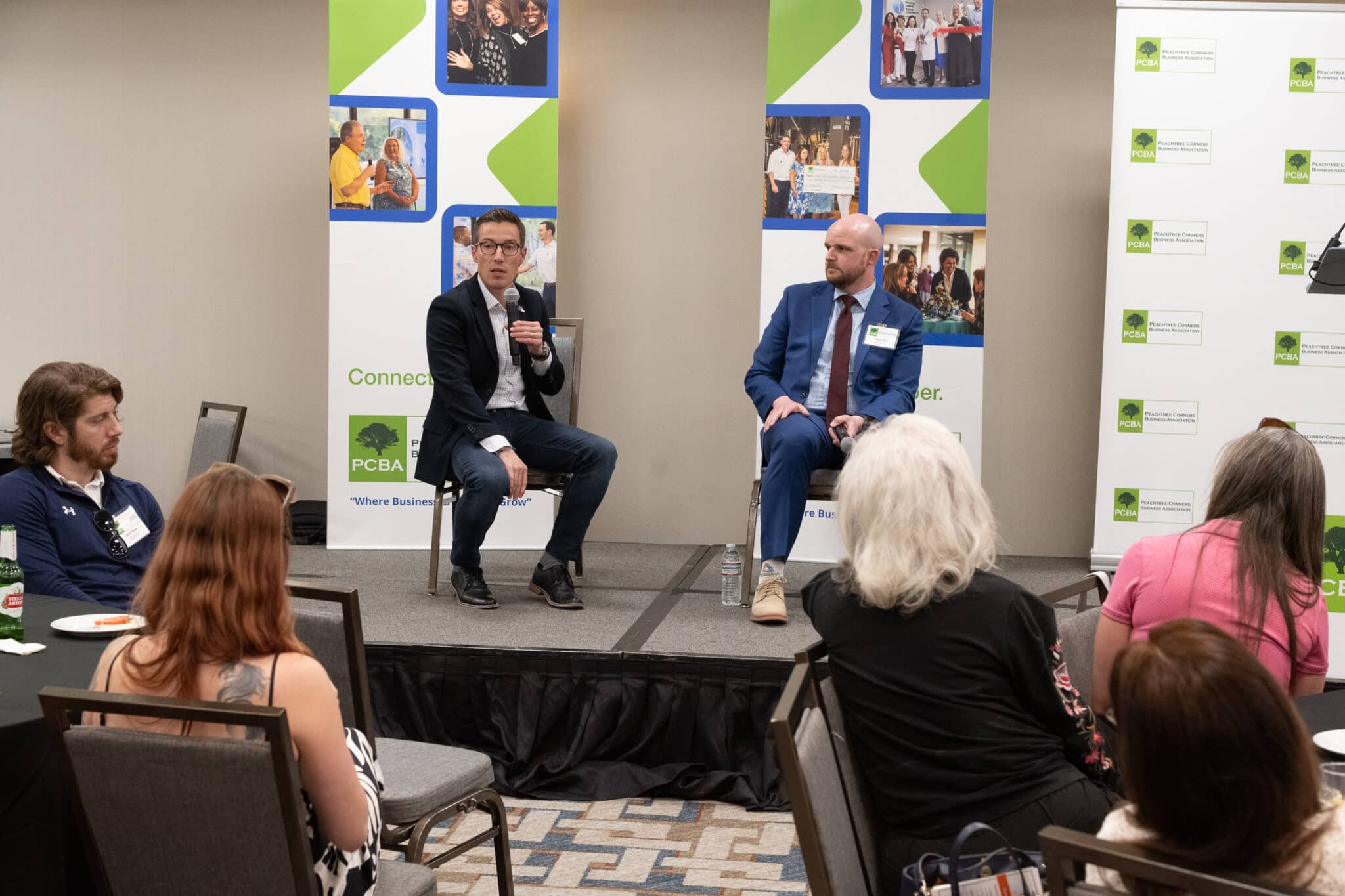
Most residents and business owners in Peachtree Corners probably think they know all about the economic development and strategic planning of Peachtree Corners, but do they really?
Peachtree Corners Business Association invited Peachtree Corners Economic Development Director Betrand Lapoire and Partnership Gwinnett Director of Economic Development Andrew Hickey to its After Hours Speaker Series on March 27 to discuss the city’s growth from a 1971 master plan to a bustling city with 42,000 inhabitants and 40,000 jobs.
Key points included the importance of business retention and expansion, with 24 projects last year creating 1,600 retained jobs, 1,600 new jobs and $250 million in new capital investment.
The Curiosity Lab, a world-class innovation center, was emphasized as a significant attraction. The city’s zoning and infrastructure plans were also discussed, focusing on balancing office and residential development to maintain a vibrant, sustainable community.
Matching jobs to residents
Although Peachtree Corners is just a teenager in terms of being an incorporated city, the foundation for this vibrant, fast-paced economic hub was laid more than 50 years ago by technology pioneer Paul Duke.
“Peachtree Corners was the first master-planned, business innovation technology park in metro Atlanta,” said Lapoire. “It was in response to the brain drain of technology with Georgia Tech graduates leaving the area.”
While the city may have a small-town feel, it’s the largest in Gwinnett County by population, but not land mass, he added.

“The city started from a commercial, industrial, R&D base and then was expanded around it,” said Lapoire.
Though home to more than 42,000 residents, most of the jobs in Peachtree Corners are filled by people who live outside the city, he added.
“So we have this interesting mismatch, in a way, although not unusual,” said LaPoire. That creates traffic and transit issues. So that means that one of the solutions is to create more jobs here to fit the profile of the community.”
He presented charts that show professional services, consulting and engineering as the largest job categories. The next tier of businesses are wholesale and manufacturing.
“So we have a good mix of industry,” he said.
A five-year plan
The city has a five-year economic development plan (2023-2028) that outlines strategies for attracting and retaining businesses, with education and workforce development being key components.
Partnership Gwinnett has similar goals as Peachtree Corners, but on a larger scale.
“We are the county’s sales and marketing arm for all 17 cities now, and we receive funding from both municipal sources as well as existing businesses here — both in Gwinnett and outside of Gwinnett as well,” said Hickey.
He shared how Partnership Gwinnett is designed to drive a lot of major corporations toward doing business inside and with Gwinnett County.
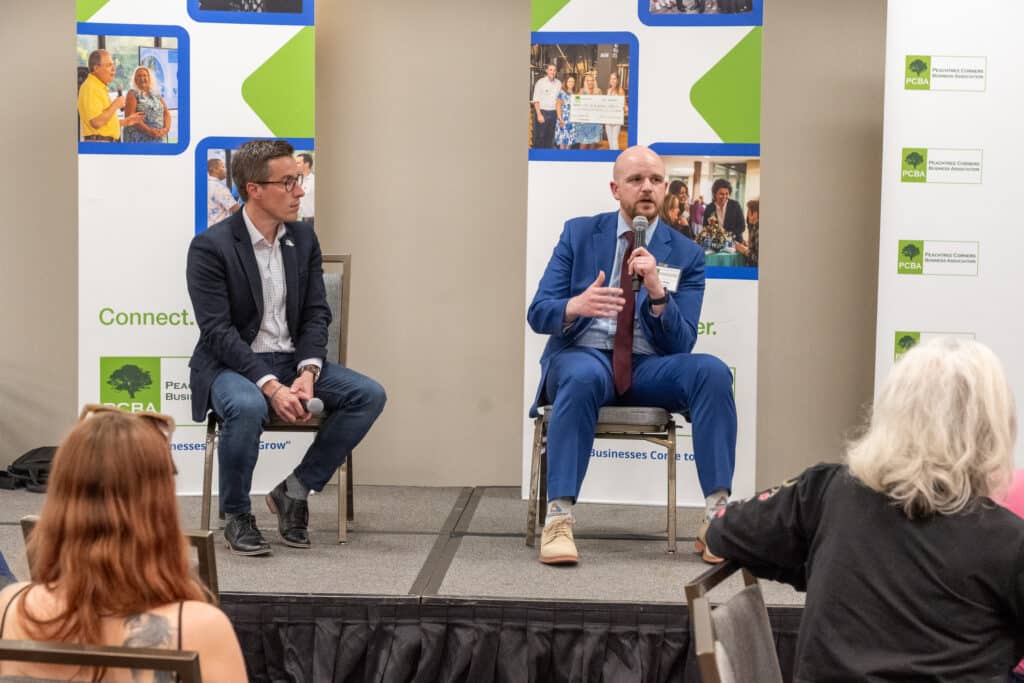
“One of the biggest things that we talk about that I’m sure it seems like most of us here, if you live here, you work here, you understand it. It’s the diversity that exists here in Gwinnett,” he said. “With a diversity index of 85, that means if we walk out of the Hilton here and we say hello to somebody, there’s an 85% chance they’re from a different ethnic or cultural background than ourselves, which to you and I may seem normal because that’s the life that we live in.”
He added that for companies, there’s a tremendous value in that, whether they have stated values, or they’re just making hiring decisions to get a wide range of candidates to fill those roles. Additionally, because of the proximity to Atlanta, Gwinnett County has a great labor draw.
Partnership Gwinnett
Partnership Gwinnett plays a significant role in recruiting businesses, expanding existing companies and developing the workforce. Hickey showed how the organization was involved with more than 24 projects last year.
“A majority of those were expansions, and that is a common thread you’ll see in economic development,” he said. “In business retention, expansion is so vital to working with our existing companies to make sure that they have the resources they need.”
He added that’s what leads to new investment and job creation in the community.
The organization also focuses on redevelopment projects, working with cities and the county to improve infrastructure and community amenities — especially strong educational institutions such Georgia Gwinnett College, Philadelphia College of Osteopathic Medicine and others.
Quality of life
In closing, both men stressed the importance of recruiting companies and developing the workforce, along with one aspect that means a lot but may not be as obvious — quality of life.
“It’s definitely evident that people like to work where they live — the whole live, work play experience,” said Hickey. “I joke that the part that people really have the most questions about, and are most excited to learn about, is new events at The Forum or Gwinnett Place Mall.”
Although they want to know what’s the next major company coming to Gwinnett, people REALLY want to know about how to spend their leisure time.
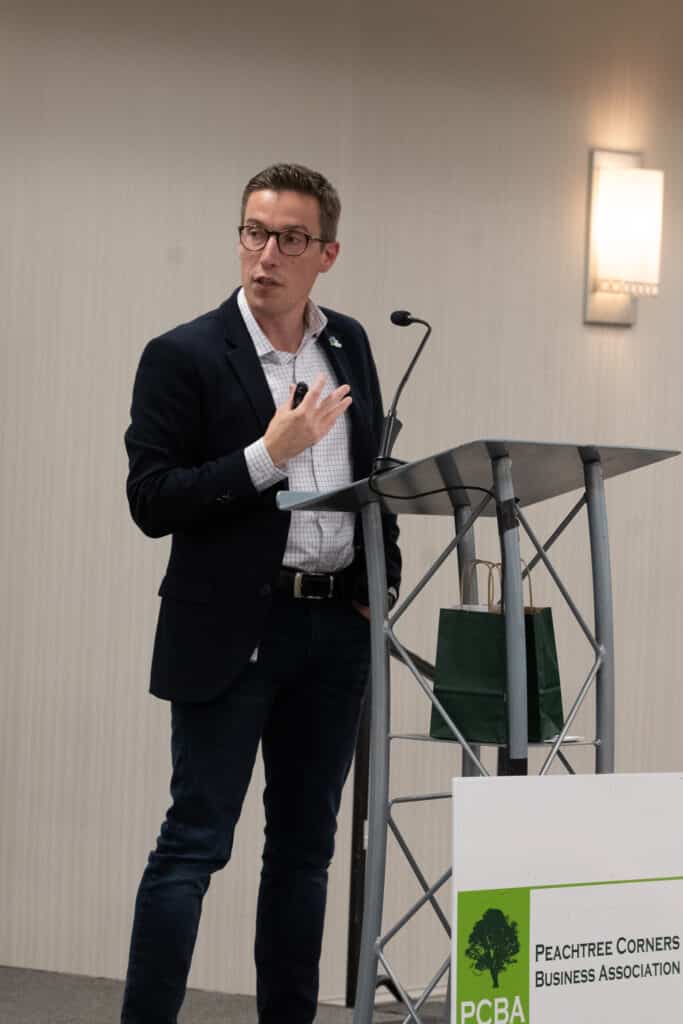
“That speaks to the importance of ensuring that we have a great community,” he said. “So at Partnership Gwinnett we work with all of our cities, and the county government as well, [on] a kind of a best-practices trip.”
He added that the peer tour allows everyone to know what the neighboring communities are doing and share the good news.
“We will take all of these elected officials, but also city staff, to different cities across the Southeast,” he said. “Last year, I believe they went to Huntsville, and have been to Greenville, Chattanooga — all cities that have done some really cool redevelopments that have taken their city to the next level. Our goal is to learn from them.”
Related
Business
Two Peachtree Corners Business Leaders Named Finalists for EY Entrepreneur Award
Published
3 weeks agoon
April 23, 2025
Ernst & Young’s Entrepreneur Of The Year celebrates ambitious entrepreneurs who are shaping the future
Ernst & Young LLP (EY US) recently announced the finalists for the prestigious Entrepreneur Of The Year 2025 Southeast Award, and two local, Peachtree Corners business leaders — David Quirk, president and CEO of DLB Associates Consulting Engineers PC and Erin Hanson, founder and CEO of Guardian Sports — made the list.
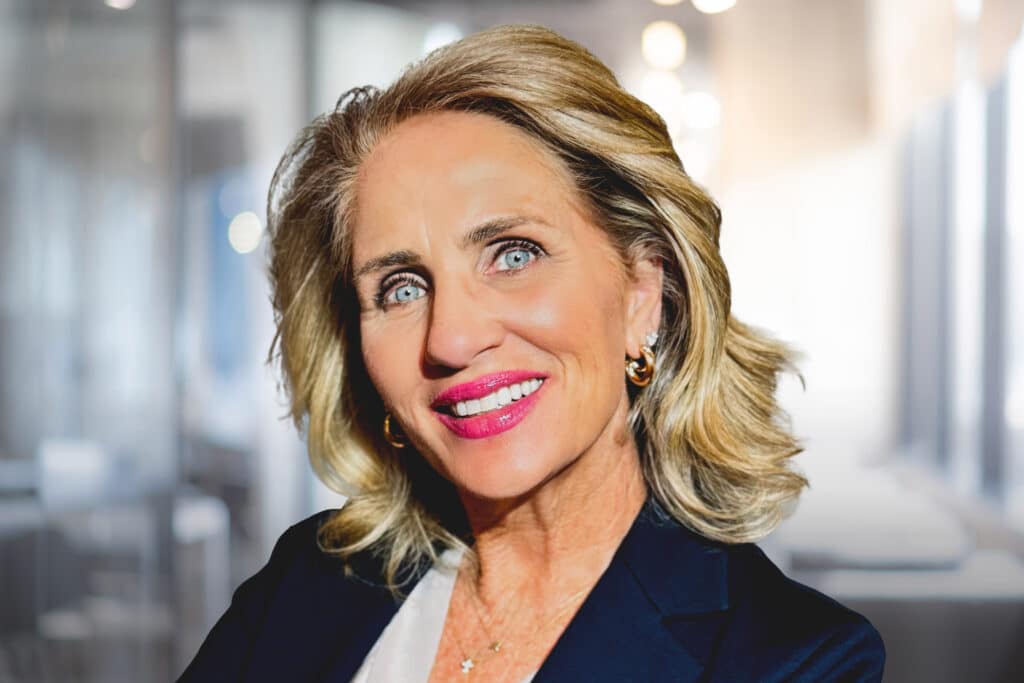
Hanson’s Guardian Sports is a family-owned company dedicated to serving athletes through safety and performance improvements in sports equipment. Major products include the Guardian Cap, PEARL ball and Guardian Infill serving the sports industry.
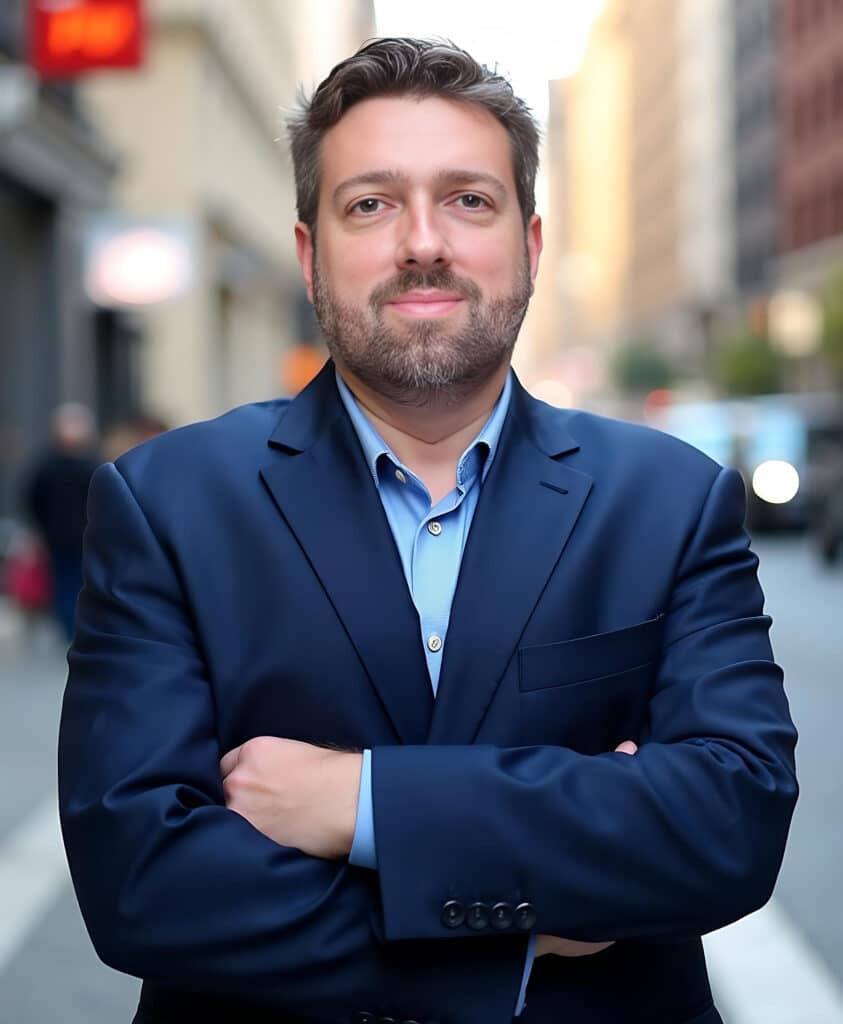
DLB Associates is a U.S.-based consulting engineering firm specializing in mission-critical and complex built environments. With more than 40 years of expertise, DLB delivers innovative, technology-driven solutions in engineering, commissioning and operations worldwide.
Celebrating entrepreneurial leaders
Now in its 40th year, Entrepreneur Of The Year recognizes the bold leaders who disrupt markets through the world’s most ground-breaking companies, revolutionizing industries and making a profound impact on communities. The program honors those entrepreneurs whose innovations shape the future and pave the way for a thriving economy and a hopeful tomorrow.
The Southeast program celebrates entrepreneurs from Alabama, Georgia, North Carolina, South Carolina and Tennessee.
An independent panel of judges selected 36 finalists for their entrepreneurial spirit, purpose, growth and lasting impact in building long-term value.
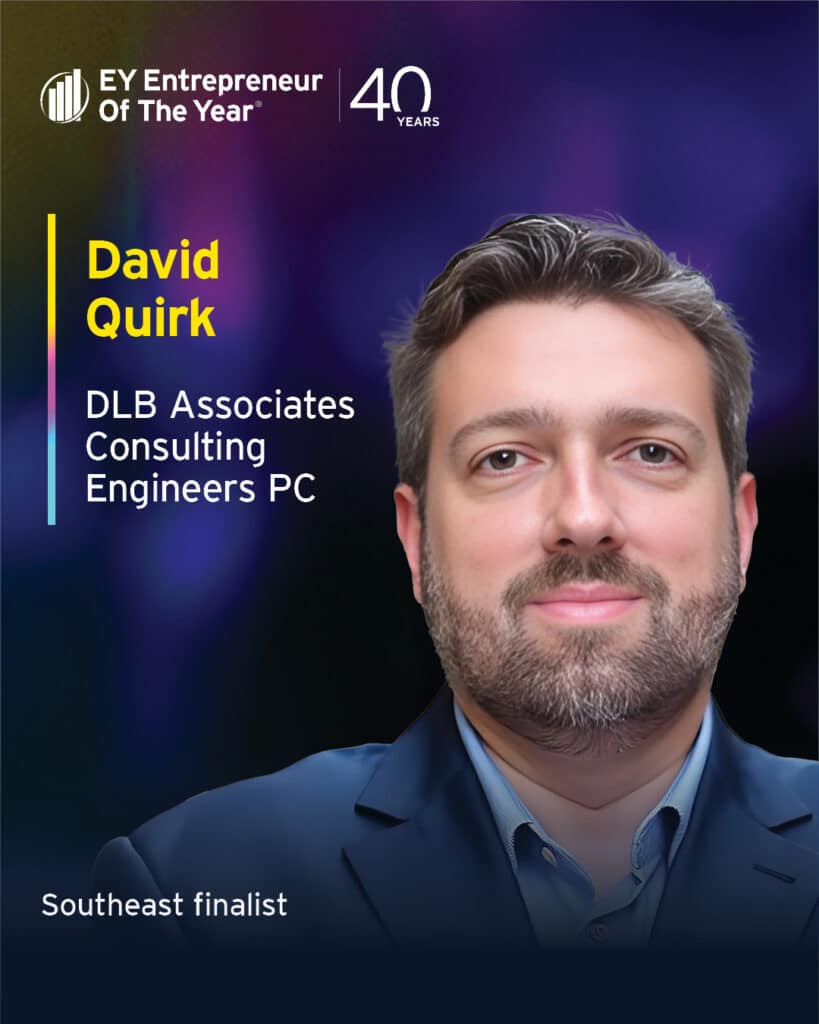

“This year’s finalists are leading examples of innovation, perseverance and resilience, illuminating paths to a brighter future for their industries and communities,” said Chevy Arnold, Entrepreneur Of The Year Southeast Program co-director.
“Their commitment to excellence transforms challenges into opportunities, inspiring us all,” added Kimberly Kicklighter, Entrepreneur Of The Year Southeast Program co-director.
Entrepreneur Of The Year honors many different types of business leaders for their ingenuity, courage and entrepreneurial spirit.
The program showcases original founders who bootstrapped their business from inception or who raised outside capital to grow their company; transformational CEOs who infused innovation into an existing organization to catapult its trajectory; and multigenerational family business leaders who reimagined a legacy business model to strengthen it for the future.
Including Quirk and Hanson, the 2025 Southeast finalists are:
- Marc Hodulich | 29029 | Atlanta, Georgia
- Damon Stafford | Alpine Intel | Charlotte, North Carolina
- Lou Hensley | Aspida | Durham, North Carolina
- Matthew Dent | Buffalo Rock Company | Birmingham, Alabama
- Melanie Little | Colonial Pipeline Company | Alpharetta, Georgia
- Will Bartholomew | D1 Training | Franklin, Tennessee
- Rene Diaz | Diaz Foods | Atlanta, Georgia
- David Quirk | DLB Associates Consulting Engineers PC | Peachtree Corners, Georgia
- Markus Scott | EyeQ Monitoring | Atlanta, Georgia
- Jon Gosier | FilmHedge | Atlanta, Georgia
- John Fitzpatrick | Force Marketing | Atlanta, Georgia
- Dr. Barry Patel | Galt Companies | Atlanta, Georgia
- Dr. Wade Smith | Galt Companies | Atlanta, Georgia
- Charles Gillespie | Gambling.com Group | Charlotte, North Carolina
- Kevin McCrystle | Gambling.com Group | Charlotte, North Carolina
- Mike Griffin | Griffin Brothers Companies | Cornelius, North Carolina
- Erin Hanson | Guardian Sports | Peachtree Corners, Georgia
- Dan Beem | Hissho Sushi | Charlotte, North Carolina
- Aaron Siegel | Home Team BBQ | Charleston, South Carolina
- Marc Murphy | Ignite Digital Services | Charleston, South Carolina
- Miller Chalk | Inglett & Stubbs, LLC | Mableton, Georgia
- Liza Rodewald | Instant Teams | Southern Pines, North Carolina
- Stephen Andresen | McClancy Foods & Flavors | Fort Mill, South Carolina
- Travis LeFever | Mission Mobile Medical Group | Greensboro, North Carolina
- Cyrus Mojdehi | Northway Homes | Charlotte, North Carolina
- Connor Ryan | NutraSky | Alpharetta, Georgia
- Fritz Owens | OTR Solutions | Roswell, Georgia
- Christopher Chuang | Relay, Inc. | Raleigh, North Carolina
- Kurt Jacobus | restor3d, Inc. | Durham, North Carolina
- Tom Kendrot | Shearwater Health | Nashville, Tennessee
- Teak Shore | Southern Lighting Source | Cumberland, Georgia
- Cindy Eckert | Sprout Pharmaceuticals | Raleigh, North Carolina
- Bryan Moore | TalkShopLive Inc. | Nashville, Tennessee
- Tina Moore | TalkShopLive Inc. | Nashville, Tennessee
- Igor Marinelli | Tractian | Atlanta, Georgia
- Joan Butters | Xsolis | Franklin, Tennessee
You can learn more about the finalists at ey.com/en_us/entrepreneur-of-the-year-us/southeast/winners-finalists.
Regional award winners will be announced on June 25 during a special celebration. The winners will then be considered by the national independent panel of judges for the Entrepreneur Of The Year National Awards, which will be presented in November at the annual Strategic Growth Forum®, one of the nation’s most prestigious gatherings of high-growth, market-leading companies.

About Entrepreneur Of The Year
Founded in 1986, Entrepreneur Of The Year has celebrated more than 11,000 ambitious visionaries who are leading successful, dynamic businesses in the U.S., and it has since expanded to nearly 60 countries globally.
The U.S. program consists of 17 regional programs whose panels of independent judges select the regional award winners every June. Those winners compete for national recognition at the Strategic Growth Forum® in November where national finalists and award winners are announced.
The overall national winner represents the U.S. at the EY World Entrepreneur Of The Year™ competition.
For more about the award, visit ey.com/us/eoy.
Related
Business
SCB Construction Group Partners with CGA Reps on New Peachtree Corners HQ
Published
4 weeks agoon
April 15, 2025
SCB Construction Group, freshly rebranded from SteelCo, secures construction project with CGA Reps for new office HQ in Peachtree Corners
SCB Construction Group has announced a strategic partnership with CGA Reps to build a new office headquarters in Peachtree Corners. The project, encompassing approximately 26,000 square feet of innovative workspace, marks a significant milestone in advancing CGA Reps’ corporate vision while showcasing SBA Construction Group’s commitment to delivering transformative construction solutions.
In collaboration with Oakley Real Estate Partners — serving as developers of the project on behalf of CGA Reps — this venture reflects a united effort to bring cutting-edge design (from Smallwood architecture firm) and operational excellence to the commercial kitchen equipment industry.
The announcement follows several high-profile projects for SCB Construction Group in 2024, including a 72,500-square-foot manufacturing center and headquarters for Process Equipment & Controls, an impressive interior build-out for Courtesy Ford Conyers’ commercial service center and the Phase 1 completion for StoreEase Loganville — recently honored as a 2024 Smart Facility of the Year by Modern Storage Media.
A bold new chapter for CGA Reps
The new 25,890-square-foot headquarters is designed to be more than just a workplace — it is envisioned as an inspiring environment that serves both client engagements and employee creativity. CGA Reps is recognized as an industry expert in commercial kitchen equipment, representing leading manufacturers, warehousing, distributing and installing everything from fryers to commercial walk-in freezers.

The facility’s design reflects this expertise, featuring a dedicated approximately 9,000-square-foot showroom kitchen that will host equipment demonstrations, tradeshows and webinars. This dynamic space will allow CGA Reps to showcase its comprehensive product range and provide clients with hands-on experiences of the latest commercial kitchen innovations.
A standout feature of the project is its innovative approach to stormwater management. With the site comprising only three acres, sufficient space for a traditional detention pond does not exist. To overcome this challenge, the design includes an underground detention system located beneath the truck court to efficiently handle all stormwater runoff.
This solution not only maximizes the use of the available land but also reinforces CGA Reps’ commitment to sustainable practices.
“We are excited to embark on this project with CGA Reps,” said Jay Bailey, CEO of SCB Construction Group. “This partnership underscores our commitment to customer excellence in design and construction, and it is a testament to the trust our clients place in our ability to deliver projects that not only meet but exceed expectations.”
Delivering excellence through proven expertise
SCB Construction Group’s track record in 2024 has been nothing short of remarkable. Earlier in the year, the company completed a 72,500 square foot manufacturing center for Process Equipment & Controls, integrating office space within a dynamic production facility.
This project was celebrated for its innovative design that balanced operational efficiency with a modern aesthetic, utilizing IMP panels to mimic tilt-up concrete, setting new standards for manufacturing environments.
Similarly, the interior build-out for Courtesy Ford Conyers’ commercial service center demonstrated SCB Construction Group’s ability to transform conventional spaces into functional and attractive environments that cater to both customer and staff needs.
The company’s commitment to quality and precision was again evident in the successful Phase 1 completion for StoreEase Loganville. This project, which recently earned the distinction of a 2024 Smart Facility of the Year by Modern Storage Media, highlights SCB Construction Group’s forward-thinking approach to construction and design, incorporating smart technologies and design that enhance sustainability and operational efficiency.
A rebranding that reflects a vision for the future
In a move that signals its evolution and growth, SCB Construction Group has recently rebranded from its former identity, SteelCo Buildings, as it spins off its construction division. This strategic rebranding is not merely cosmetic — it represents a renewed commitment to capabilities, credibility and client-focused service.
The refreshed brand is anchored by a new tagline “Deep Expertise, High Expectations” and a clear brand promise that communicates the company’s mission: to craft exceptional construction experiences based on precision, innovation and trust.
“Our rebranding is about more than just a new name or logo; it’s a renewed promise to our clients and communities,” explained Robert Lee, marketing director at SCB Construction Group. “We believe that our updated brand identity, including our invigorated tagline and mission statement, encapsulates our dedication to pushing the boundaries of design and construction. It reflects our commitment to creating spaces that are as inspiring as they are functional.”
Transforming spaces to inspire and connect
The new headquarters for CGA Reps is expected to become a landmark facility in Peachtree Corners. Beyond its impressive architectural design and advanced construction techniques, the building is planned as a hub for innovation and collaboration.

The interior build-out will include dynamic client reception areas, interactive meeting rooms, and dedicated spaces designed to foster creativity and teamwork among employees. The layout is crafted to ensure that every area of the facility contributes to a productive and inspiring work environment.
“By investing in this state-of-the-art facility, CGA Reps is making a strong statement about the future of work,” said Bryan Young, VP of construction at SCB Construction Group. “Our team is dedicated to designing and building spaces that not only serve the immediate needs of our clients but also create environments that motivate and inspire. The new headquarters will be a testament to that vision.”
Looking ahead
The partnership between SCB Construction Group and CGA Reps marks a significant step forward for both companies. As SCB Construction Group continues to build on its legacy of excellence and innovation, this project is poised to set a new benchmark for modern office headquarters design in the region.
With a strategic focus on creating spaces that inspire, connect and drive success, the future looks promising for both SCB Construction Group and its esteemed partner, CGA Reps.
For more information on the new headquarters project or to learn more about SCB Construction Group’s portfolio, visit scbcg.com.
Related
Read the Digital Edition
Subscribe
Keep Up With Peachtree Corners News
Join our mailing list to receive the latest news and updates from our team.
You have Successfully Subscribed!

Digital Edition

Official City Merchandise Line Debuts This Saturday at Town Green

Paul Duke STEM High School Student Earns CGO Scholarship

World Blood Donor Day Starts Here: Theo’s Miracle, Katherine’s Mission [Podcast]

Executive Function: A Tribute to Working Moms

Peachtree Corners Grows Business Opportunities Through Economic Development

Simpson Elementary Marks Exceptional Children’s Week

Peachtree Corners Hosts Discussion About the Future of Local Policing

Atlanta’s Dog Howl-O-Ween Festival Moving to Peachtree Corners for 2025

D1 Training Brings New Fitness Concept to Peachtree Corners

Peachtree Corners Hosts Discussion About the Future of Local Policing

City of Peachtree Corners Awarded Certificate of Achievement From GFOA for Seventh Straight Year

Simpson Elementary Marks Exceptional Children’s Week

Executive Function: A Tribute to Working Moms

Official City Merchandise Line Debuts This Saturday at Town Green

Peachtree Corners Grows Business Opportunities Through Economic Development

Light up the Corners [Video]

Capitalist Sage: Business Leadership in Your Community [Podcast]

Cliff Bramble: A Culinary Adventure through Italy

Top 10 Brunch Places in Gwinnett County

A Hunger for Hospitality

THE CORNERS EPISODE 3 – BLAXICAN PART 1

Top 10 Indoor Things To Do This Winter

The ED Hour: What it takes to Remove Barriers from Education










